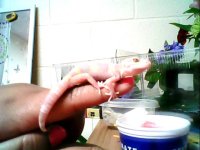Hello, I have a young albino gecko, and I've noticed that his ability to catch prey is a bit off compared to my other young gecko.
When I first got them neither would eat but after about two days they both started to eat. For comparison, these are the two ways my geckos feed:
Cleo, my 2nd gecko: All I have to do is put the prey in front of her so that she sees it and it catches her attention. She snaps it right up.
Leo, my albino: I have to hold the food right in front of his face to get his attention, sometimes the only way he'll focus on it is if I let the prey "tickle" his nose or snout. Then he'll lock his eyes on it. He'll stare at it for a solid minute or two- VERY LONG TIME when you're just sitting there waiting. Sometimes I'll hold it in front of him with a pair of forceps, other times I'll pin it down on the ground in front of him. I usually have to hold the prey down because if it crawls or hops away he'll just give up instead of give chase.
Even when I hold the prey down for him and wait, when he finally does snap at it, he often misses. He snaps so hard that he'll catch a bit of reptile carpet in his mouth and have to pull his mouth free. Sometimes he'll miss as much as three times before he catches the prey, which is time consuming because he'll stare for a solid 60 seconds before he tries again. He does best when I touch the prey against his mouth, and once he gets started with the first few prey items he gets better and better for the duration of that feeding.
He doesn't seem to show any other coordination issues, he's a fast runner, he walks just fine, so I'm wondering if it's an issue of sight, not coordination. He'll go to the dish to get a worm from the dish, but he often misses a few times first.
Is it normal for young albino geckos to have bad eyesight? Is this something they grow out of, or is this an issue I might potentially just have to deal with for the duration of his life?
As far as set up, they're temporarily in a 10g vivarium, split in half with an UTH in the middle so they have a warm spot and a cool spot. Cool spot ranges between 75-78 and hot spot ranges between 92-100. The 10g will be used while they're still young, they will be upgraded to their own individual larger tanks as they grow. They're fed mealworms and crickets, occasionally dusted in calcium.
When I first got them neither would eat but after about two days they both started to eat. For comparison, these are the two ways my geckos feed:
Cleo, my 2nd gecko: All I have to do is put the prey in front of her so that she sees it and it catches her attention. She snaps it right up.
Leo, my albino: I have to hold the food right in front of his face to get his attention, sometimes the only way he'll focus on it is if I let the prey "tickle" his nose or snout. Then he'll lock his eyes on it. He'll stare at it for a solid minute or two- VERY LONG TIME when you're just sitting there waiting. Sometimes I'll hold it in front of him with a pair of forceps, other times I'll pin it down on the ground in front of him. I usually have to hold the prey down because if it crawls or hops away he'll just give up instead of give chase.
Even when I hold the prey down for him and wait, when he finally does snap at it, he often misses. He snaps so hard that he'll catch a bit of reptile carpet in his mouth and have to pull his mouth free. Sometimes he'll miss as much as three times before he catches the prey, which is time consuming because he'll stare for a solid 60 seconds before he tries again. He does best when I touch the prey against his mouth, and once he gets started with the first few prey items he gets better and better for the duration of that feeding.
He doesn't seem to show any other coordination issues, he's a fast runner, he walks just fine, so I'm wondering if it's an issue of sight, not coordination. He'll go to the dish to get a worm from the dish, but he often misses a few times first.
Is it normal for young albino geckos to have bad eyesight? Is this something they grow out of, or is this an issue I might potentially just have to deal with for the duration of his life?
As far as set up, they're temporarily in a 10g vivarium, split in half with an UTH in the middle so they have a warm spot and a cool spot. Cool spot ranges between 75-78 and hot spot ranges between 92-100. The 10g will be used while they're still young, they will be upgraded to their own individual larger tanks as they grow. They're fed mealworms and crickets, occasionally dusted in calcium.


